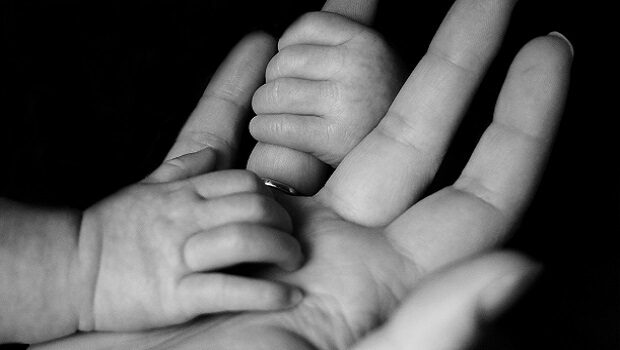The Mother is Me
1.
I’m lying on an operating table, shaking involuntarily, but the nurse checking my vitals doesn’t seem concerned. “The mommy shakes,” she tells me, the blood pressure cuff tightening around my arm. “We can give you something for that once the baby is out.”
Later, I’ll understand that “mommy shakes” are a real thing, a common physiological response to the hormonal and fluid shifts of labor. But at that moment, blinking under the fluorescent lights, I imagine them to be something more visceral: a writhing woman crossing a chasm, her swollen belly contorting in the air.
The blood pressure cuff releases its grip, but I’m still trembling, and I’m brought back to a recurrent nightmare in childhood where I’m in the passenger seat of a car careening downhill. Right before the inevitable crash into oncoming traffic or the edge of a cliff, my mother emerges from the ether, jumping into the driver’s seat to pump the brakes and steer us out of harm’s way.
Now, 30 years later, I scan the room in search of that same assurance of safety. But the medical staff is busy, sharpening instruments and setting up the surgical drapes. My daughter’s heart monitor and mine beep in synchrony. We’re a set of Matryoshka dolls 20 hours into a stalled labor, our fates intertwined. My head is full of questions, first and foremost: Are we going to be alright? Followed by: Why is the staff discussing the schedule for the week?
Finally, they admit my husband, who walks in purposefully with his hazmat suit, surgical cap, and mask. If he’s freaking out, he’s too concealed to show it. He follows the instructions I painstakingly prepared about the birthing playlist and sets up Allah Las on the Sonos, instrumental surf rock wafting through the operating room like a gentle breeze.
And then the procedure begins, and time moves very quickly.
“Just a little pressure now,” the doctor says from the other side of the drape, my innards sloshing like a 1970s waterbed. What seems like moments later, I hear her: my daughter, bellowing out a long, operatic cry.
“Congratulations, she’s beautiful,” the nurse says, “a beautiful baby girl.” Jillian, my diamond plucked from deep in the earth, is wrapped in a green and white striped towel and wearing a pink headband with a bow. The nurse places her on my chest. Squinting, she surveys me before settling into the crook of my neck. I close my eyes. I’m a free-flowing river, a dandelion in the breeze, a cloud in the sky. But also, a patron emerging from a double feature, dazed by the daylight.

2.
Sometime during my four-day stay in the hospital, the grey spring pirouettes into summer, and while there is lots of reference material regarding sleep deprivation and sore nipples, nothing prepares me for the sweat.
Where does it come from? Under the padding of my belly band, it glistens down my back, soaking through my adult diaper. Hazy from Roxicodone, my feet the size of sausages, each toe glistens in a slick sheen. How can I be expected to care for Jillian when I feel like I’m straight out of the circus, an outstretched, sweat-drenched, fun-house version of myself?
We’re discharged, anyway.
My daughter has a tongue tie that has yet to be diagnosed, and so we spend those first days at home suffering through forty-five-minute feeds that surpass her wake window and cross into the realm of overtiredness. Overtiredness, that baffling state where my daughter grows too tired to sleep and so instead screams, her red eyebrows quivering at the immense injustice she’s encountered only days into the world. Nighttime isn’t sleepless but almost worse: two-hour amuse bouche brackets of rest, fragmented by alarm reminders to begin feeding again.
In those first days, the alarm startles me each time. I wake up with my hair matted, my sheets soaked, as if reporting for duty with the flu to a job for which I’m completely unqualified. Carrying Jillian from the bassinet to the rocking chair, I recall sick days from childhood: my face burning, chicken soup on the nightstand, a quilted duvet up to my chin. The light tap of my mother knocking at the door, the gentle creak as she walked in. “Oh, you poor thing,” she’d say, pressing a cool, lotioned hand to my forehead. “You poor thing.”
It was effortless nurturing, I only realize now, in the glow of the night light. The work of a magician, the way she could ease my pain away. Will it ever come that easily to me?
I rock my daughter, humming as she cries against my damp chest.
3.
Shortly after Jillian’s tongue tie release, my fatigue so immense that it feels like a fire is burning at the base camp of my eyelids, my mother comes over to help. But my hopes for a seamless hand-off are complicated by Jillian’s screaming.
“Just give me a pacifier,” my mother says, without a hint of hesitation. “A pacifier always soothed you.”
I hand my mother the pacifier solely because of the confident way that she asks, even though I’ve tried giving Jillian one before, and it never seems to do the trick. Still, maybe Mom will have the magic touch.
She plops the pacifier into Jillian’s mouth, and Jillian rejects it, spewing it across the floor.
“I don’t understand,” my mother says, genuinely baffled as she bounces Jillian on her lap. This is unnerving and not what I envisioned for the day: her sauntering in and scooping up the baby and singing nursery rhymes, all of my struggles melting away as I walk up the stairs to take an invigorating nap.
I need to regroup. “I’ll be right back,” I say, walking to the bathroom. To which Jillian cries even louder, shrill shrieks of indignation filling the air.
“It’s Ok-ay, Jill-y,” my mother says, her voice a sing-song, every syllable an elastic rubber band that can be stretched. “You’ll see your mother in a second.”
For a brief moment, Jillian stops crying, and I lock the bathroom door, still jarred by the realization that hasn’t fully sunk in: the mother is me. Standing there on the cold laminate floor, in the unforgiving glare of the mirror, I am startled, too, by the bags under my eyes, the grey in my hair. I am 35 years old, and I can’t for the life of me understand why I still feel like a needy little girl, why the transition from being cared for to caring for another feels so startling and abrupt. But I have a baby girl who needs me, and I can either let that reality stupefy me, or I can get in the driver’s seat and try to solve the problem.
I splash some cold water on my face and leave the bathroom.
“I’ll take her,” I say, walking over to the rocking chair where my mother is continuing to bounce Jillian without avail. “There’s something I want to try.”
I recall a tip the doula taught us on one of the first nights home from the hospital, and place Jillian on her belly across my arm. Perched like a koala, her legs dangling from either side, she lets out a massive burp. And then she relaxes, sucking her thumb as she burrows into my chest.
“Wow,” my mother says, clearly impressed. Frankly, I’m impressed too. I take a deep breath.
4.
The motherhood journey isn’t linear. There are days when everything is fine, even great, when Jillian sleeps in, eats well, and smiles at everyone she meets. And then there are the days when her gums are inflamed or she breaks out in a rash, the days when she cries at a party and we have to leave early, the days when a regression means sleep proves elusive, no matter how many times she rubs her eyes. There are days when I’m haggard, and doubtful, and want to curl into a little ball. How am I supposed to do this? I ask myself. How has anyone ever done this? These are the days when I call my mother, and she’ll remind me that I’m doing better than I realize. Yeah, right, I’ll say.
But then I’ll sing Jillian her favorite song, or present her favorite stuffed animal, or season her chicken with the exact right amount of oregano, and, bit by bit, I grow more confident in my ability to conjure fairy dust and make everything better. Not because I’m a magician, but because I’m finally learning to trust my instincts. To recognize that when it comes to my daughter, I am the one who knows best.
5.
Time marches on, and it’s summer again: Jillian has just turned one, and we’ve recently started a new bedtime routine where I supervise her as she crawls up the stairs.
Crawling is recent, and as with any new skill, it’s an effortful dance. On all fours, Jillian concentrates as she props one knee up and then another. As she hoists herself up, she looks over at me, a proud grin spread across her face.
“Good job,” I say, “onto the next.”
With each step forward, I like to think that Jillian and I are both letting go of what doesn’t serve us. It’s been a year of babbling, crawling, clapping, crying, and laughing. Of bottles, breastmilk, and snack plates. Of park playdates and developmental milestones, of escaping to the Bay Area following one of the worst fires in LA history, and the survivor’s guilt upon returning home to find everything miraculously intact.
Through the fear and the joy, the giggles and the tears, there’s this sense that the two of us are constantly changing, that just when I think I’ve figured us out, we shift yet again.
“Come on, Jilly,” I say, my hand on her back. “Just one more step.”
Cover photo by Liv Bruce on Unsplash







One Response to The Mother is Me